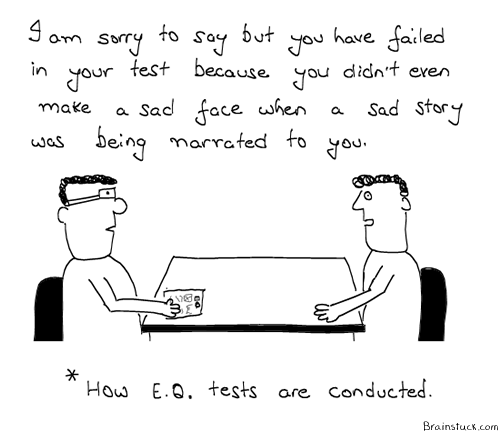Emotional Intelligence Is Bogus. Here’s Why.

One of Aziz Ansari’s recent tweets became one of my all-time favorite quotes:
[embed]https://twitter.com/azizansari/status/663520119675572224[/embed]
We’re always told that working hard and getting good at something will bring us success, but we’re not always told that being nice to others is just as important.
In other words, you can be the most persuasive salesman or the top dog developer at your company, but if you’re an asshole, nobody’s going to want to work with you.

We still love you, Iron Man.
In order to actually be nice, we need to have a good read on our own emotions as well as everyone else’s. This ability is famously labeled as emotional intelligence (EI, or EQ), and studies have shown that having EI relates to how well we do at work, how well we lead, and how well teams work together.
The last two decades, emotional intelligence has gained a huge popularity in the media and business world. Time named Daniel Goleman’s best-seller Emotional Intelligenceone of the 25 most influential business books of all time, and since his book, a multimillion-dollar EI industry was born. More than 150 consulting firms offer EI-related products and services, and according to Emotional Intelligence 2.0, 75% of Fortune 500’s have adopted EI products and services.
Like any psychology and management fad (Myers-Briggs Personality Tests and consensus management, begone!), there is some reason to believe that Emotional Intelligence has peaked. But with the World Economic Forum’s recent claim that EI will be the sixth top job skill in 2020, in congruence with rising popularity of other EI-related concepts like psychological safety, my guess is that EI won’t be disappearing anytime soon.
But there’s one big problem with emotional intelligence. Nobody knows what the hell it is.
Two Definitions of EI
Despite how popular EI is, organizational scientists are extremely skeptical of how valid the concept is. Researchers have been split between two definitions of EI: ability EI and mixed EI.
Ability EI is your ability to accurately reason emotions and use them to improve the quality of your thoughts. Mixed EI is a combination of your personality traits, your emotional experience, and your perception of your abilities. Author Daniel Goleman was the one of the first to develop this definition of EI.
Mixed EI is highly related to job performance, so to the journalists and business world, mixed EI is a sexier definition. However, to academics, Ability EI is grounded in more scientific theory.
The Research on EI in a Nutshell

Dana L. Joseph and colleagues published a meta-analysis last year to make sense of what mixed EI actually is, and why mixed EI is an uncommonly strong predictor of job performance. From analyzing 36 studies and controlling for the effects of self-efficacy, self-rated performance, cognitive ability, three personality traits, and ability EI — all well-validated constructs that also predict job performance — they found that mixed EI’s effect reverses: mixed EI predicted lower job performance. The authors state:
“…62% of the variance in mixed EI is captured by Conscientiousness, Extraversion, Emotional Stability, ability EI, cognitive ability, general self-efficacy, and self-rated job performance.” [a]
No wonder mixed EI predicts job performance. It’s mostly a combination of other scientific constructs that already predict our job performance. This sheds light to Rutgers University Professor Cary Cherniss’ suggestion that researchers need to clearly distinguish the definitions of EI and emotional and social competence:a related construct that is included in measuring mixed EI.
If mixed EI isn’t telling us anything new, what about ability EI?
Professors Catherine Daus and Neal Ashkanasy claim that classic philosophy and modern psychology both conceive emotion and cognition as separate predictors for work and life successes. Because ability EI solely captures emotions (while mixed EI captures both), they suggest we stick to ability EI. And Joseph and colleagues note that while ability EI shows a weaker relationship with job performance, it measures EI as an actual intelligence. It’s optimistic to know the research is moving toward a single definition.
In Adam Grant’s Atlantic piece on EI, he wittingly (or dare I say, intelligently) said, “If you felt intense negative emotions while reading this piece, it’s an excellent opportunity to put emotional intelligence into action.” While the academics are at work to better understand EI, what can we take from what we know about it now? What about EI can we apply to our workplaces?
Three Suggestions for Organizations
1. Know that EI is beneficial in some roles/jobs more than others.
EI isn’t a panacea — its benefit to you depends on your job. So if you’re a leader in your organization, don’t force it on everyone. Instead, encourage those who would benefit from it most, like your sales team and customer service reps.
2. Choose your EI measures wisely.
Don’t rush into choosing the EI service that everyone’s raving about. Use what you know (and hopefully what you just learned) about the research to make an informed decision on your EI product/service of choice.
3. Practice being mindful of your emotions.
EI academic debate aside, the research is unanimous on the benefits of mindfulness. Being mindful of our emotions greatly improves your (and your team’s) performance, health, and well-being. Every now and then at work, try to recognize your current emotion (“I feel sad”), ask why you’re feeling that way (“Because the Oreos from the vending machine are sold out”), and regulate the emotion if needed (“I’ll be okay! I’ll just pick up some Double-Stuffed Oreos after work”).
Intelligence for Intelligence’s Sake
In his recent piece, Complex Intelligence, Esko Kilpi wisely concluded:
Unless you genuinely value the perspectives of others, and not just the ones that conform to your own, you are not going to understand them. Truly intelligent thinking is not just a means to an end: it has to be rooted in what we see as ends in themselves, the values by which we live.
I’m no EI researcher/consultant, but while Esko refers to our intelligence of complex systems, I think his conclusion holds true for EI, too.
When we as academics and practitioners approach EI not to scrutinize but to understand, we’ll all be more intelligent about emotional intelligence.
Ready to change how you work? The Ready helps complex organizations move faster, make better decisions, and master the art of dynamic teaming. Contact us to find out more. While you’re at it, sign up to get our newsletter, Brave New Work Weekly, delivered to your inbox every week.
Follow me on Twitter | Follow The Ready on Twitter | TheReady.com
[a]: From page 309 of Journal of Applied Psychology, Volume 100(2).
Much-deserved recognition is due to Caruso, Mayer, & Salovey, Cary Cherniss, Dana & colleagues, Daus & Ashkanasy, Hülsheger & colleagues, O’Boyle & colleagues, and Rice, Murphy, & Sideman.
